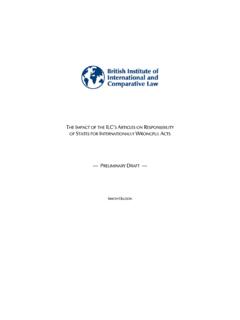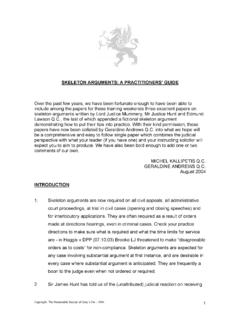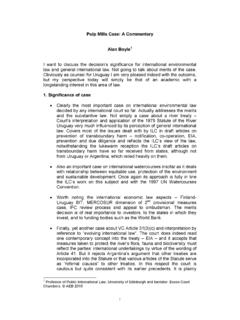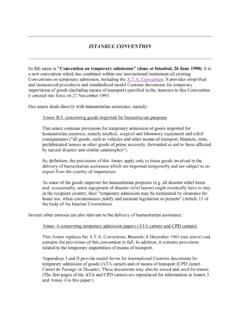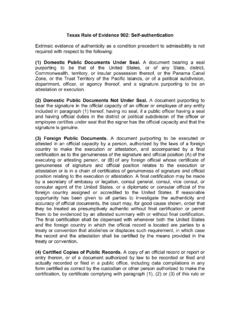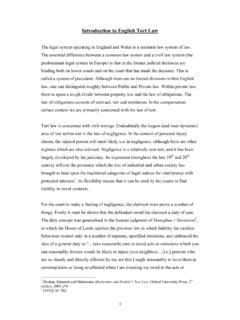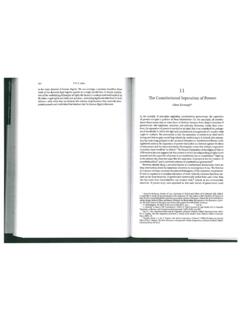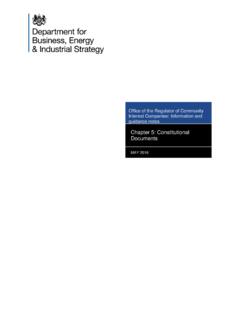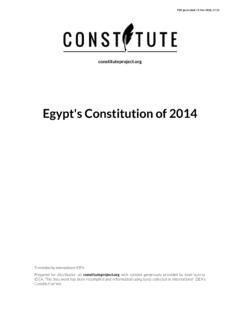Transcription of Constitutional Awareness - International and Comparative ...
1 ConstitutionalAwareness MyanmarOctober 2013 Brought to you byCONSTITUTIONAL AWARENESSThis document is a guide to the constitution and Constitutional reform. It consists of:A. What is a constitution ? ( )B. Key Provisions of the Current Burmese constitution ( )C. Possible Areas for Reform ( 25)The document is not written for the specialist in Constitutional law. Nor is it intended to be fullycomprehensive. It selects those issues which appear to be most relevant to Burma/Myanmar at thepresent download this document in PDF version, visit AWARENESSA. WHAT IS A constitution ?
2 A constitution is a collection of rules and principles which set out how a state will begoverned. It forms the framework for all decisions made by every government official and, particularlythe legislature (the law making body), executive (President/Prime Minister/ministers) andthe courts. It also sets out the rights of everyone which must be respected by the state and thereforeestablishes the relationship between the government and the people. Why is a constitution important?A constitution is important because it ensures that those who make decisions on behalf of thepublic fairly represent public also sets out the ways in which those who exercise power may be held accountable to thepeople they serve.
3 And it sets out where government powers end by guaranteeing individuals specific rights andfreedoms. These rights help to assure the protection and promotion of human dignity, equalityand may provide for the division of powers between the central government and theregions. Constitutions should be agreed rather than imposed so as to provide an acceptable frameworkfor the settling of different political views. They help provide for a stable society by ensuring that,although everybody may not agree with the government all the time, the people accept thelegitimacy of the system of choosing download this document in PDF version, visit does a constitution contain?
4 A constitution will often contain a number, if not all, of the following features:A Preamble: This sets the constitution in context, outlining the state s fundamentalvalues and objectives. The Identity of the State: The constitution may set out the official language orlanguages, the country s flag, who is eligible to be a citizen and the position of the state inthe world. A Bill of Rights: The constitution will set out the rights of individuals and thecircumstances in which these may be limited or to the rule of law:Many constitutions endorse the rule of law, wherebylaws must be clear and accessible, equally enforced, and where people have theopportunity to assert their rights in courts where they must receive a fair trial beforeindependent and impartial judges.
5 The Role and Composition of the Legislature (Law Making Body): The constitutionwill set out who will make up the legislature and how its members will be chosen. Theremay be one or two bodies and the constitution will say what their respective roles Role and Composition of the Executive (President/ Prime Minister/Ministers): The constitution will determine who will be part of the executive and howthey will be chosen. It sets out the powers of the executive including those of the head ofthe executive (president / prime minister). In some constitutions the head of state has agreat deal of powers, and in others the head of state is more in the nature of therepresentative of the people, and the main executive power is wielded by a prime constitution also sets out how the executive is accountable for the exercise of powerto the legislature, the courts and the Structure and Appointment of the Judiciary.
6 The constitution sets outconditions for choosing judges and their independence from the other branches ofgovernment (the legislature and the executive) as well as the kinds and levels of role and method of appointment of the government legal advisor (Attorney General)and public prosecutors will also normally also be provided for in the constitution . Provisions for Elections: The constitutionsets out requirements for elections. Thesemay include which voting system is to be used, regulations for political parties, who maystand for election and regulations regarding how elections are to be carried out fairly andhonestly.
7 To download this document in PDF version, visit Important bodies : The constitution may provide for additional bodies such as acentral bank, and bodies to support democracy, for example an Electoral Commission,Anti-Corruption Commission, Financial Oversight Commission or a Human RightsCommission. The Structure of the State: The constitution will determine how power is to beallocated between the national, regional and local Economy and Distribution of Resources: Some constitutions set out whicheconomic system a state is to follow (for example, market economy or socialism).
8 Mosthowever leave that question to the choice of the people. It may also determine hownatural resources and other wealth are to be allocated between levels of government Role and Control of the Armed Forces/Police: The constitution may set out theduties of the military and police as well as provisions for their supervision, control andaccountability. Emergency powers: The constitution should address who can declare an emergencyand in what circumstances, and who is granted what powers during an emergency. Amendment Provisions: The constitution will set out how it can be changed, normallyby a majority of more than 50 per cent of the members of the legislature and sometimesalso by a referendum of the people.
9 What distinguishes a constitution from Laws Made by the Legislature?Because they form the framework for all decisions and actions of officials, the rules andprinciples outlined in constitutions are normally regarded as superior to laws passed by thelegislature. This means that representatives in the legislature should only pass a law if it is compatiblewith the constitution . The courts normally have the role of deciding whether a law conflictswith the constitution . Since Constitutional rules have this higher status there are often tougher requirements forchanging them than for ordinary law.
10 However, it is important that a constitution can beamended so it can undergo improvement and respond to changing circumstances. Constitutions also usually allow for the suspension of some or all of its provisions, but onlyin time of emergency, such as when it is seriously necessary to safeguard national securityor vital public interests. 4To download this document in PDF version, visit can a constitution protect individuals rights?A constitution can protect individuals by outlining their rights, normally in a bill of rights at or nearthe beginning of the constitution .
